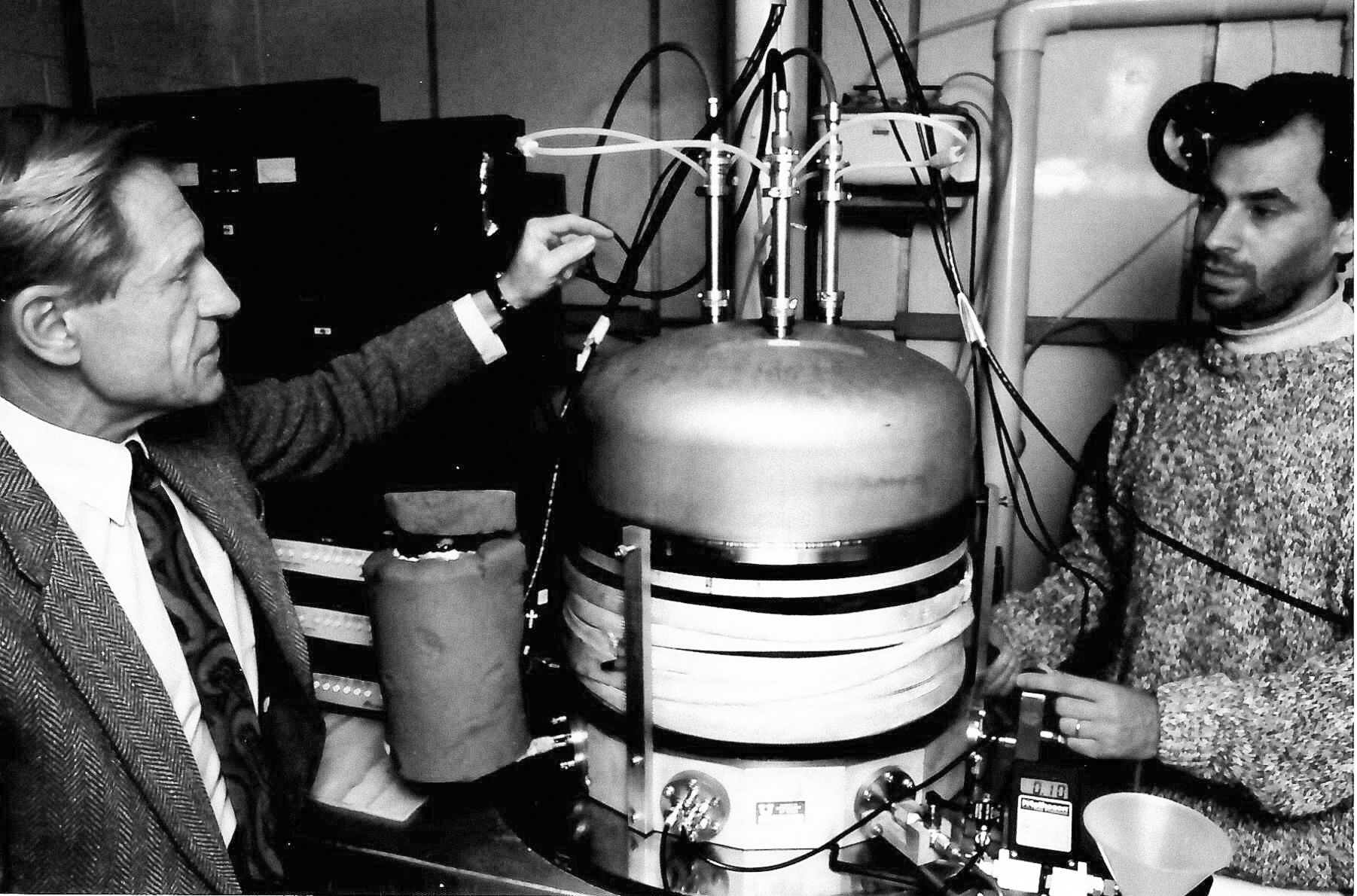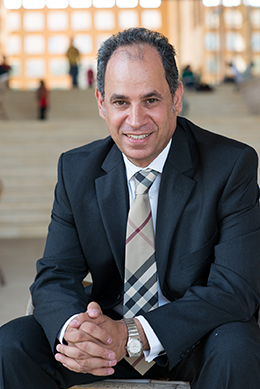
Around the world, our University of Utah international alumni are making an impact. In this series, “U International Alumni Abroad” we spotlight some of their stories.
Since 2017, Dr. Ehab Abdel-Rahman has served as Provost of top-ranked The American University in Cairo (AUC). Below he reflects on what he learned during his time as an international graduate student (Abdel-Rahman’s area of specialty is thermoacoustics and photonics), post-doctoral fellow, and research assistant professor at the University of Utah from 1995-2003, and how his time here influenced the course of his life.
Can you tell me about yourself and what your journey to this point has been like?
Sure. I got my bachelor’s and master’s degrees from a national university in Egypt and I had always wanted to go to the U.S., so then I started to apply to American universities to get my doctorate in Physics.
I got accepted to a few institutions, and I then started to look closely at whom I would want to work with. I found Dr. Orest Symko. He still works at the U today and we are still in touch. In fact, I just exchanged emails with him a couple of days ago. He helped make my Ph.D. journey in Utah very enjoyable, and when I graduated, I was hired to stay on as a postdoc and then as an assistant research professor.
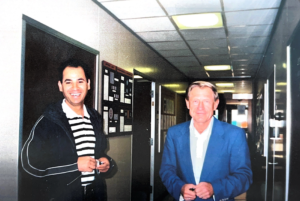 After that, I signed a contract with a company in Silicon Valley as a senior research & development scientist. But, just a week later, I had to tell them I was very sorry, but I could not accept the position. I knew what I truly wanted to do was to go back to Egypt and serve my country.
After that, I signed a contract with a company in Silicon Valley as a senior research & development scientist. But, just a week later, I had to tell them I was very sorry, but I could not accept the position. I knew what I truly wanted to do was to go back to Egypt and serve my country.
My current job is the best of both worlds. I drive my car every day to work “in the U.S.” (AUC is a private American institution), and then I drive my car “back to Cairo,” to live in my country and be with my family at night.
What was it like arriving in Utah from Egypt?
I traveled to Utah with my late wife, Iman (who also ended up going to graduate school and teaching at the U in the Linguistics department and Middle East Center). We arrived just before Labor Day 1995 and didn’t realize the university would be closed for the holiday weekend. (laughs) Here we were, two young Egyptians, our first time in the U.S., so eager to get started on our new life, and we couldn’t meet with anyone for three long days.
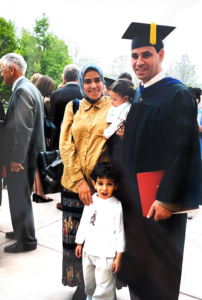 What advice or encouragement would you give to other international students?
What advice or encouragement would you give to other international students?
Shortly after we arrived at the U, Iman got very sick and she ended up having open heart surgery within a month. Facing that incident alone was tremendously difficult. So, you need people around you. My advice to anyone, when they travel internationally, is to build a support system and make friends quickly.
When I went to the U, I noticed that students tended to cluster within their country groups. Do not do this. Try to understand the country you are in, and meet fellow international students from other countries. Safety comes from understanding others, not hiding from them. Do not waste this incredible opportunity to befriend people from all over the world–it is an experience you will not get anywhere else. These people will become like family to you.
Who helped you during your time at the U?
My mentor, Orest Symko, and his late wife Ivanna. When we first arrived to SLC, my wife and I lived in a small apartment downtown and we had no car. I remember Orest came and picked us up on a weekend and took us to Park City for the first time. He treated me as family. I really hope I can pay that forward.
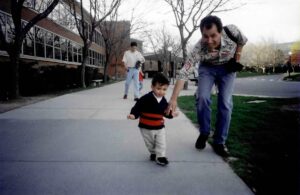 What was the best piece of advice given to you by your mentor(s) at the U?
What was the best piece of advice given to you by your mentor(s) at the U?
Right away Dr. Symko identified some gaps in my education, so he encouraged me to attend undergraduate courses in addition to my graduate work. This was so valuable. I still remember him seeing my progress and telling me “You went from zero to hero” because I sat in for those extra classes. I would not have been able to succeed at that level without his keen eye and encouragement.
What did you learn from that experience?
Your education is about you understanding what you like and thoroughly exploring what you’re going to practice in the future, so be strong and disciplined with the things you like to do. That’s very important. The grade doesn’t matter as much as your ability to thoroughly understand the subject. Take initiative, make mistakes, and learn from them. I like the quote “ Fail Fast, Fail Often, Fail Forward.” This is what I remind my students and my own children.
How did the U prepare you for your role as Provost?
I really owe it all to the U. You see, I was not a typical physics student and the U accepted that in me. Yes, I wanted to get a Ph.D., but I was also very interested to know why the U.S. higher education system works better than the system in Egypt. So, from the start, I went all over campus asking questions. “What does the provost do? What does the president do? Why are buildings named after donors?”
Observing how the University of Utah ran when I was a student gave me a foundation that supports my work today.
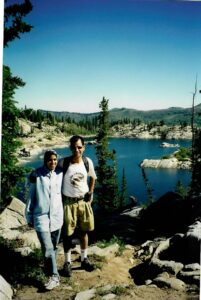 How do you think you have you made an impact in your current role?
How do you think you have you made an impact in your current role?
Well, I really like what I do, and I strive to be a good teacher to those around me. I try to be contagious with my enthusiasm for this work.
If you ask me what my achievement as Provost at AUC is, it is that I have built a great team. They are all better than me. If you are a B person and you get A people to work for you, then the average is a A-/B+, whereas if you are a B person and you hire a C person, the average is B+/C-. For me, I am always trying to increase the average.
What do you miss about Utah?
So many things! I miss the Avenues. Red Butte Garden. Seeing the U sign on the mountain. I miss the smell of the air. The Utah Jazz (I was there during some good years!). Whitewater rafting on the Colorado River. The hike to Lake Blanche. Park City. You name it!
What should U students do if they make it to Cairo?
Cairo is a very old town with a rich history, but it is also modern. I would suggest exploring both. Go to Old Cairo—it’s over 1,500 years old. Strike up conversations with the young people; it’s a different generation with new ideas. Get to know the people. Try the food. And, of course, come to visit AUC. AUC works as the bridge between the two cultures!

